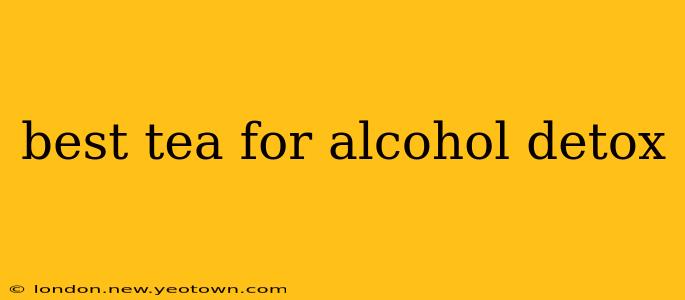Let's be honest, detoxing from alcohol is tough. It's a journey that demands patience, support, and a commitment to self-care. While tea won't magically erase the effects of alcohol abuse, certain varieties can offer soothing comfort and support your body's natural processes during this challenging period. This isn't a replacement for professional medical advice; always consult your doctor before beginning any detox program. This article aims to explore how certain teas can aid in the recovery process, focusing on their potential benefits and not promising a miracle cure.
My name is Alex, and I’ve spent years researching the holistic approaches to wellness, including the role of herbal remedies in supporting various bodily functions. While I'm not a medical professional, I'm passionate about sharing accurate and evidence-based information.
What are the benefits of tea during alcohol detox?
Many teas boast properties that could potentially ease some of the unpleasant symptoms associated with alcohol withdrawal. These benefits are largely due to the presence of antioxidants, vitamins, and minerals. These nutrients can help combat dehydration, a common side effect of alcohol consumption, and support overall well-being. Remember, hydration is key during detox, and tea, when coupled with plenty of water, can contribute positively.
What types of tea are best for alcohol detox?
Several teas stand out for their potential to aid in alcohol detox. It's important to remember that the effects are often subtle and should be viewed as supportive, not curative.
1. Chamomile Tea: A Soothing Companion
What makes it good? Chamomile is renowned for its calming properties. Alcohol withdrawal often involves anxiety and insomnia, and chamomile's gentle sedative effects can help alleviate these symptoms. Its mild, floral flavor makes it a pleasant beverage, especially when you're feeling unwell.
2. Ginger Tea: Easing Nausea and Upset Stomach
What makes it good? Alcohol can wreak havoc on your digestive system. Ginger is a potent anti-nausea remedy, helping to settle an upset stomach and reduce feelings of nausea and vomiting – common withdrawal symptoms. Its spicy warmth can also be incredibly comforting.
3. Peppermint Tea: A Digestive Aid
What makes it good? Similar to ginger, peppermint can soothe the digestive tract. It can help relieve bloating, gas, and indigestion—all potential side effects of alcohol withdrawal and the subsequent dietary changes. The refreshing taste is also a bonus.
4. Green Tea: A Source of Antioxidants
What makes it good? Green tea is packed with antioxidants, which help combat free radical damage. Alcohol consumption increases oxidative stress, so the antioxidants in green tea might offer some protection and support the body's natural repair mechanisms.
5. Rooibos Tea: Gentle and Caffeine-Free
What makes it good? Rooibos is a caffeine-free option, which is crucial during alcohol detox. Caffeine can exacerbate anxiety and insomnia, so a soothing, caffeine-free tea like Rooibos is a better choice. It's also naturally sweet and can be enjoyed without added sugar.
Does tea help with alcohol cravings?
While tea itself won't directly curb alcohol cravings, its calming and soothing properties can help manage some of the underlying anxiety and stress that might trigger cravings. By promoting relaxation and reducing discomfort, tea can indirectly support you in navigating the challenging emotional aspects of alcohol withdrawal. However, it's crucial to address cravings through professional guidance and support.
Can tea help with withdrawal symptoms?
Teas can offer some relief from certain withdrawal symptoms, such as nausea, anxiety, and insomnia. However, it's essential to remember that they are not a substitute for medical treatment. Severe withdrawal symptoms require immediate professional medical attention.
What other natural remedies support alcohol detox?
Beyond tea, maintaining a healthy diet, staying well-hydrated, getting enough rest, and engaging in gentle exercise can all contribute positively. Crucially, seeking professional help and support is vital for successful and safe alcohol detox. This could involve therapy, support groups, or medical supervision.
Disclaimer: This information is for educational purposes only and should not be considered medical advice. Always consult with a healthcare professional before making any decisions related to your health or treatment, particularly concerning alcohol detox. Alcohol withdrawal can be dangerous, and professional medical guidance is essential.

